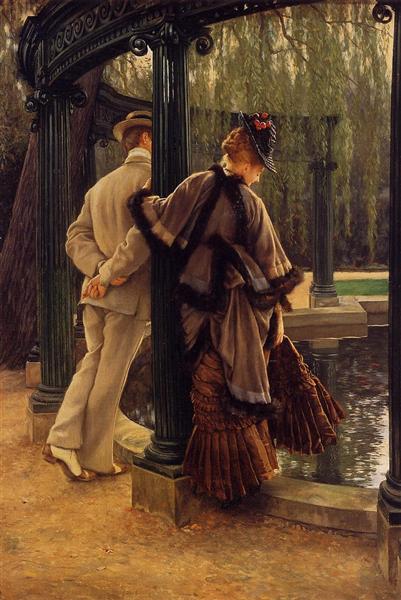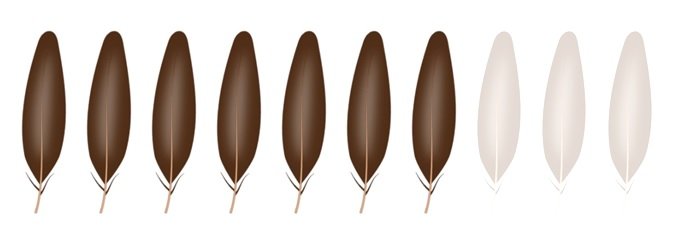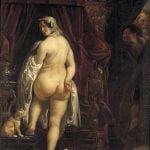Review made by Eleonor Nolan.
July 6, 2020.
Synopsis:
•Introduction: Failed marriages

The plot has two main characters, Philippe de Marcenat and Isabelle de Cheverny with only the first one appearing constantly throughout the novel.
The story focuses on the love lives of both characters and is divided into two parts; the first one is told by the character of Philippe and the second one is told from the perspective of Isabelle. Each part becomes a composition that evokes the structure of a private diary. However, the events are not cataloged by date, but separated from each other by chapters. In addition, the texts had been written after the end of the events that are narrated. In the first case, we found a time-lapse of five years and, in the second, three months later.
Although there are no acts of violence in the novel, the characters have intense feelings of jealousy, envy, mistrust, betrayal, anguish and depression that lead them, at least to one of them, on the verge of delusion.
In this section, we will only say that in the first part of the book Philippe de Marcenat reveals the intimacies of his relationship with Odile Malet and describes his subsequent separation from her. Then, in the second part, Isabelle de Cheverny introduces us into her life with Philippe himself until the end of their relationship.
Below you can find the conceptual lines of the novel in a more precise way.
• Part One: Philippe de Marcenat and Odile Malet
Philippe’s cousin, Renée, was right when she defined him as an obsessed person. Being like her father, a lover of books, Philippe found in his childhood’s readings the stereotype of a woman that should be fragile, unhappy, frivolous and, nevertheless, intelligent; a princess in need of help, candid and sweet who should allow herself to be rescued. Denise Aubry was the first woman in whom Philippe embodied this ideal. That first contact with love left indelible marks.
What happened between them? Philippe was still a boy and Denise was a few years older than him. One night, when Denise was lying on the grass, and Philippe was near her, taking her ankle with his hand and settling for that crumb of affection, he heard a conversation between her and a lover. This fact caused him a wound in his heart. After this disappointment, women became, out of spite, a mere body to obtain carnal pleasure and then be discarded once his thirst was quenched. Later, as a man, he would see Denise again and would concrete the affair he had not been able to have when he was just a teenager. In this way, he would take revenge for the suffering she caused him by ignoring the love that was then offered to him.
Philippe met his first wife, Odile Malet, in the winter of 1909 during a stay in Florence, Italy. There, he found the favorable conditions to allow himself to devoutly love a girl who did not differ much in any way from the previous ones. They were engaged after a few weeks and got married a few months later. Neither one of the families agreed to their affective bond. Both found the relatives of the other inadequate to join their own: in one case for the excessive lightness in manners and the reckless conduct in life, and on the other for its excessive rigor.
Shortly after his wedding, Philippe’s existence became torture because of his wife’s moral promiscuity. Surrounded by men, hated by women, she aroused her husband’s jealousy. Odile turned out to be the focus of constant compliments and invitations from gentlemen; and derogatory comments from the ladies. Even her childhood best friend, Misa, came to speak disparagingly of her and executed double betrayal by becoming Philippe’s lover and revealing to him what he already suspected; her precious Odile had also a lover.
Philippe’s first marriage ended in divorce at the request of his wife. Less than two years after their separation, she got married with the man with whom she had cheated on him.
• Part Two: Isabelle de Cheverny and Philippe de Marcenat
At the same time Philippe writes his account, temporarily speaking, when he has already lost the love of his first wife, Isabelle also writes hers when she has lost the love of his second husband.
Isabelle met her first husband, Jean de Cheverny, when she served as a volunteer nurse in a blood’s hospital during the First World War. Their marital coexistence lasted four days, then Jean rejoined her regiment and found death in 1916.
The director of that blood’s hospital in Paris was Renée de Marcenat; she took Isabelle under her tutelage for her skills in the matter. In dealing with Renée, Isabelle began to hear comments about Philippe and got the opportunity of seeing him for the first time at the Baroness de Choin’s house. Renée, Isabelle, and Philippe developed a friendship bond as a result of that evening. From there on, the small group went out on various occasions to appreciate concerts and share dinners and walks.
Time after, Philippe and Isabelle began to see each other alone, which leaded to an informal courtship until he asked her to marry him. Isabelle was too dazzled at the beginning of her relationship by Philippe’s qualities, and was not aware of the critical and ironic personality that he showed. However, after the first months of living together in Paris, the harshness with which he would judge every aspect of a situation, and every thought of a human being according to his criteria and tastes, would be more noticeable.
But more than this attitude of her husband, what would lead her to misfortune would be his lifestyle: Constant dinners in the houses of people that he did not know well enough or whose treatment was superficial; going out alone with other women; unexpected changes in his work schedules. Isabelle would be unable of two things; to adapt herself to that social life that Philippe seemed to long for so much, and to tolerate his friendship with other ladies.
Sooner rather than later, she could not prevent the outcome from occurring. Philippe would concentrate all his resources in courting one of those ladies and would fall in love with her. Were they lovers? Most likely not, considering the characteristics of the woman he wanted to have. Anyhow, sentimental involvement existed and destroyed Isabelle. Even the child she gave birth to, was not enough to keep her husband by her side.
That union, in which Isabelle had to respect the whims of her husband and be careful not to question his behavior, also had its end as the one described in the first part of the novel. But it ended differently. That cowardly man who required the care of a weak woman ended up succumbing.
Analysis of the work:
The analysis of the work, due to its complexity, leads us simultaneously, and indirectly, to a study of the characters. Therefore, by wanting to go into detail, we shall be delving into the way of thinking and feeling of each one of them. Having expressed the above, we begin the study of the novel.
• Denise Aubry as a turning point:
It is easy to deduce that the character of Philippe has relevance for being present in both parts of the book. In the first, as a protagonist; in the second, as a secondary actor. It is therefore essential to analyze the two most important episodes of Denise Aubry in the story to understand why a boy who could have remained his entire life with a healthy inclination towards romanticism ended up becoming a cynic with the need to have someone he could seize, metaphorically speaking, with his hands.
a) Episode One; Denise’s arrogance
When summer came, I saw her more easily on the tennis court. One afternoon, under splendid weather, several young couples decided to dine there. Mrs. Aubry, who knew very well that I loved her, asked me to stay. The dinner was very joyful. It got dark. I was lying on the grass at Denise’s feet, my hand found her ankle, which I gently took without her protesting. Behind us were some syringe clumps, whose penetrating aroma I still seem to perceive. I saw the stars through the branches, it was a moment of perfect happiness. As the darkness deepened, I noticed, sliding toward Denise, a twenty-three-year-old boy, a lawyer famous in Limoges for his ingenuity; and, despite myself, I could hear the conversation they had in low voice. He begged her to meet him in Paris, in a place whose address he provided.
(Climates, Translation from the Spanish version; Editorial Círculo de Lectores, page 17 to 18).
She murmured:
-Shut.
But I understood that she would go. My hand did not leave her ankle, which she abandoned happily and indifferently, but I felt hurt and soon conceived a wild contempt for women
Here is the origin of evil. His wounded sensitivity transformed him into a libertine. For what reason? The need of feeling a man; which for him meant exercising his superiority as such, both intellectually and physically.
b) Episode Two; Denise, the devoted lover
During the winter, the last months of the year 1906 and the beginning of 1907, that woman became his mistress to be humiliated with the same disdain with which she dismissed him. Every detail that he had loved on her, seen with another magnifying glass, became an unforgivable defect that made him feel repulsed by her mere presence.
I lived for my books and did not conceive that one could live in a different way than mine. She asked me to lend her works by Gide, Barrès, and Claudel, about whom I had spoken so much; but what she said later disliked me. She had a wonderful body, and I wanted her violently as soon as I returned to Limoges. However, when I spent two hours in her company, I was assailed by the desire to die, disappear, or speak to a friend
(Climates, Translation from the Spanish version; Editorial Círculo de Lectores, page 12).
What was previously considered candor, was taken as a lack of mental clarity; what was sensual in her manners was considered as a capricious behavior to get attention; what had been beautiful and delicate in her features, turned out to be vulgar. It was necessary to despise the characteristics that would have made him fall in love to avoid falling into ruin.
• Renée’s love for her cousin:
When Philippe divorced his first wife, he found in Renée a company with which to distract himself from his sorrows and to whom trust his confidences. Renée was the daughter of his father’s brother; she dedicated to medicine and it was of public knowledge that she did not want to get married. At the same time, she was the only member of his family who had a reserved behavior and who had never made any judgment about Philippe’s failed marriage. The talks he could have with Renée were of great interest to him; science was one of the topics of conversation that most delighted him. Thus, a solid friendship was established between them in a few months; but Renée basically wished for a romantic relationship.
How many years did that situation last? Maybe two, or three. Unfortunately, Renée was forced to stay away from Philippe’s life since he rejected her. Renée eventually forgot her cousin thanks to a colleague’s kind heart.
Now, Renée could have been the right woman for Philippe if he had not insisted on denying his true character:
My two favorite companions were André Halff, a smart young Jew, but slightly gloomy, whom I had met at law school, and Bertrand de Jussac, one of my fellow students from Limoges who had entered Saint-Cyr and was passing Sunday evenings in Paris, in our company. When I saw Halff or Bertrand, I seemed to immerse myself in the deepest sincerity. Superficially, I was my parents’ Philippe, a simple man, with some Marcenat-type conventions and some weak resistance. Then came Denise Aubry’s Philippe, rapturously sensual and tender, brutal by reaction. Then Bertrand’s Philippe, sentimental and bold. And then, Halff’s Philippe, precise and tough. And I knew perfectly well that, above all of them, there was still another Philippe more authentic than the previous ones and who could have made me happy if I had agreed to meet him. But I did not try to do so
(Climates, Translation from the Spanish version; Editorial Círculo de Lectores, page 20).
Renée played the role of the disinterested woman supporting her cousin during the mourning for his divorce. She represents the concept of healthy love and resignation when knowing oneself not loved. It is one of the few actors of the novel that stands out for her loyalty to her principles and values.
• Isabelle’s breeding:
The house on Ampère street. The flowerpots in their pots wrapped in green cloth. The Gothic-style dining room; the office, whose gargoyles advance like a high-relief; the armchairs on whose back Quasimodo’s head is sculpted. The red damask parlor, gold-trimmed armchairs. My room when I was single, painted in a white that had been virginal and now had become dirty. The study room, the junk room where on gala nights I dined with my governess. Often Mademoiselle Chauvière and I had to wait until ten o’clock. A sweaty servant, gruff and tired, brought us, in a dish, a slimy soup of melted ice cream. It seemed to me that the man understood, as well as I, the snubbed and the almost humiliating role that the daughter played in that house
(Climates, Translation from the Spanish version; Editorial Círculo de Lectores, page 125).
Isabelle was breeded by her parents in an excessively rigorous manner. She was deprived of all comfort and constantly subjected to cruel criticism to accustom her to the troubles of life. Consequently, her self-esteem was destroyed before she became a woman.
I was an awkward girl who had an immense need for tenderness. I was considered tough, awkward, and smug. I was tough because I spent my life holding back my emotions; awkward because freedom of movement or ease in conversations had always been denied to me; and smug because, too timid, too modest to talk gracefully about myself or funny topics, I took refuge in serious ones
(Climates, Translation from the Spanish version; Editorial Círculo de Lectores, page 127).
And then, as an adult, without ever being loved, she felt the need to please the desires of others to earn their affection:
In her presence it is not possible to express the slightest wish because the following day she would appear with a package containing what I wanted. She pampers me as you pamper a child, as I pampered Odile. But I realize, with sadness and horror, that so much kindness distances me constantly from her
(Climates, Translation from the Spanish version; Editorial Círculo de Lectores, page 152).
Contradictorily, this behavior was the reason why her second husband chose her as his wife since her submission allowed him to keep his old manners while obtaining the privileges of married life.
Having never considered herself a beautiful or intelligent woman, it was difficult for her to believe that she could arouse the interest of men. The mistrust in herself sown by her mother deprived her of happiness. She would never have ended up with a contemptuous man like Philippe if she had considered herself a person of great worth.
• The philosophy of life of Baroness de Choin:
Although we have hardly mentioned her, she is a recurring character in the novel and it is worth noting a fragment from one of the dialogues she held:
Well, if you never have more serious misfortunes than that you can consider yourself a happy woman… What are you complaining about? Isn’t your husband faithful? Men are never faithful (…) But take my poor Adrien as an example. Do you think I was never fooled? Dear Isabelle, for twenty years of my life he had my best friend, Jeanne de Casa-Ricci, as a lover. Naturally, I am not going to tell you that this did not seem unpleasant to me at first, but things got better over time (…) Sure… I also believe in marriage, but I have had the opportunity to verify that marriage is one thing and love, another… You have to have a solid frame, but nobody has forbidden to embroider arabesques…
(Climates, Translation from the Spanish version; Editorial Círculo de Lectores, page 191 to 192).
Most of the female characters shown in the novel agreed with this view of Baroness de Choin; they were sensual with every man they wanted to attract and then made him their lover. Why getting a divorce if both circumstances (matrimony and adultery) could coexist in perfect harmony?
In this regard, both Isabelle and Renée are in an opposite position. The first is governed by scruples and the second by the intellect. Can a man fall in love if not through a seduction game?
• Odile’s spirit:
After the loss of his first wife, Philippe internalized her personality traits (for example, her demands, her false humility, and her hypocrisy) and started acting like her. Behind this procedure was hidden, on one hand, his need to deny the absence of his beloved Odile and, on the other hand, the urgency to avoid loneliness. Living his life through Odile’s mindset, channeling his existence as she would have liked to channel hers, he fictitiously honored her memory and the love he had professed for her. When Philippe criticized Denise Aubry so harshly for having conquered a man displaying as her own the concepts and knowledge that he had instilled into her, no one would have believed that the following observation he made about the essence of the human being would apply so well to his own case:
The spirit of women is formed by successive sediments contributed by the men who have loved them. The tastes of these preserve, as well, the confused and overlapping images of the women who have passed through their lives. Frequently, the atrocious sufferings that one woman had made us feel become the cause of the love that we inspire in another, and her misfortune
(Climates, Translation from the Spanish version; Editorial Círculo de Lectores, page 21)
• The ideal of love:
Every ten years, we should erase from our spirit some ideas that experience has proven to be false and dangerous. Ideas to delete:
(Climates, Translation from the Spanish version; Editorial Círculo de Lectores, page 220).
a) “Women can be bound by an oath or a promise”. It’s false. Women lack morality; they depend, for their customs, on those whom they love.
b) “There is a perfect woman with whom love would be a continuity of joys without any mixture of the senses, the spirit and the heart”. Two human beings joined together are like ships shaken by waves; helmets collide and groan
Both characters, Philippe and Isabelle, at their opportune moment, awake from their reveries to recognize that their concept of love is unattainable. Being human’s character full of imperfections, no passion can escape from that fragmentation that defines us; and much less last forever. We can only hope that the feeling will transform into something that does not fill us with pain. And perhaps, without waiting for it, this feeling will manage to offer us a quiet life full of infinite moments of contentment. Without intending it, we could find in the peace of a simple and unpretentious relationship the longed-for paradise.
Critics:
There is a precise, perhaps minuscule, detail that differentiates the Philippe from the early years of his youth from that who married Odile Malet not so long after.
The Philippe we met between 1906 and 1907, during his love affair with Denise Aubry, was a young man with a strong and determined personality; a man focused on his studies and who knew what his interests were. He had acquired a deeper understanding of women from his dealings with the Parisian society and was no longer a prey of them even though he still retained some of his old personality traits as a dreamy and romantic boy. Here is a quote from that time of his life:
I seduced them without loving them, for pleasure and to prove myself that victory was possible. I remember the calm with which after one of them had left my room, smiling at me tenderly, I sat in an armchair, took a book and forgot effortlessly his features
(Climates, Translation from the Spanish version; Editorial Círculo de Lectores, page 22).
The Philippe of 1909, on the other hand, had already a superfluous personality, lacked courage, and quickly succumbed to the manipulations of a beautiful woman.
The question is: How an otherwise impossible change come about in someone who already had his identity defined? Philippe himself says the following words about those years of debauchery:
The tender lover and desirous of devotion understood that the beloved woman did not exist in real life. He refused to identify an adorable and vague image with too rude figures, therefore he took refuge in books and limited herself to loving Madame Mortsauf and Mrs. Renal. The cynic had dinner at Aunt Cora’s house and had with his female neighbor at the table if she did not dislike it, light-hearted and provocative conversations
(Climates, Translation from the Spanish version; Editorial Círculo de Lectores, page 23).
That said, it is not plausible that the character that unfolds in the first chapters is the same one that appears on the remaining pages of the novel. There are also several loose ends in these initial descriptions that Philippe makes about himself. It seems that some passages have been written by a man of certain characteristics while other fragments have been written by a completely different one. Although the novel explicitly mentions an existing duality in the personality of this subject, either this duality has been poorly expressed or we are faced with two possible sketches that the writer failed to amalgamate in the construction of his character.
Conclusion:
The work has an exquisite writing technique. It perfectly describes the psychology of several of the characters and immerses us into their thoughts, revealing their most intimate secrets. It contains countless passages to highlight for its perfection in the use of language. However, carelessness on behalf of Maurois in the composition of the novel diminishes its value.
Qualification: 7/10 feathers.




Good description of Philippe de Marcenat’s personality.